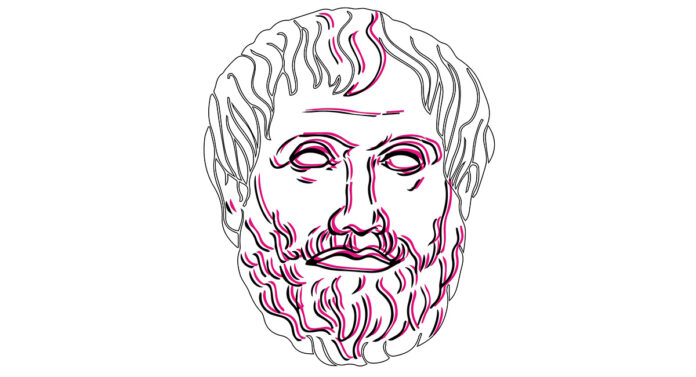Il potere è del sovrano: il potere è il sovrano. Sovrano è chi decide nello stato di eccezione, detiene il bene e il male, ridistribuisce il buono e il cattivo, qualifica il bello e il brutto, stabilisce l’amico e il nemico, l’intensità di una associazione o di una dissociazione e organizza la forza.
Il potere è il corpo stesso del re. Il re è con dio, è dio. Il re è Stato e non solo la rappresentazione dello Stato.
Così sino a quando il popolo ha sostituito Dio. È comparso nella scena un nuovo soggetto politico: la massa (quando e come è da capire. Ma ciò è accaduto). Lo Stato si è allora configurato come movimento e il potere come mera rappresentazione del potere (d’altra parte non c’è potere senza rappresentazione del potere). Il potere è apparso di per sé come arbitrario se non illegittimo e allora è diventato fondamentale legittimarlo come norma delle norme, procedura delle procedure, ragione in sé e per sé. Ciò che era fondamentalmente religioso è diventato in sé politico: la chiamano teologia politica. È comparsa la figura potente, immane, anche se acefala del laico. Tutto è diventato o imposizione o contrattazione.
Si è rimosso ciò che ci ha fatto presente nel 1937 Roger Caillos: “… il potere appartiene necessariamente al dominio del sacro. Attingendo la sua autorità all’essenza stessa del fatto sociale e manifestando il suo aspetto imperativo senza intermediari o perdita di energia, il potere dell’uno sugli altri istituisce fra gli esseri umani una relazione irriducibile alle pure forme del contratto”. Era il 1937 e il sacro, non più trattenuto da alcunché, stava riemergendo in tutto il suo orrore con l’olocausto.
Si deve tornare alla regalità? Impossibile: ogni tempo ha la propria forma di potere. Rendere le ragioni laiche sempre più perfettibili? Mera igiene concettuale, visto che, comunque, nel fondo sta il tremendo. E allora?
Se avessimo chiesto ad un diplomatico della metà del Settecento quale fosse lo Stato più potente ci avrebbe risposto: “Quello che ha un esercito più forte”. La stessa domanda posta alla prima metà dell’Ottocento avrebbe avuto come risposta: “Quello che ha maggior quantità di materie prime”. Ai primi del Novecento: “Quello che ha maggior sviluppo scientifico e quindi maggiore ricerca applicata”. La stessa domanda posta oggi potrebbe avere la seguente risposta: “Quello che ha la maggiore capacità di calcolo”.
Il potere oggi sta nel massimo dell’astrazione implicita nelle logiche digitali; nell’elaborare tutto come dato (come stato di relazione), nel rendere tutto a disposizione.
È da qui che bisogna ripartire per ripensare il potere, la politica e a come trattenere il sacro e, forse, imparando a vivere responsabilmente senza aver bisogno di fondamenti, se non caso per caso. Qualcuno la chiama complessità, ma è qualcosa che sta oltre, forse in un’insondabile profondità.
Power belongs to the sovereign: power is the sovereign. Sovereign is the one who decides in the state of exception, holds the good and the evil, redistributes and qualifies the good and the bad, establishes friends and foes, the intensity of association or dissociation and organizes the force.
Power is the king’s own body. The king is with god, he is god. The king was the state and not just the representation of the state.
And so it was until the people replaced God. A new political subject appeared on the scene: the mass. When and how it is still to be understood, but so it has happened. The state was then configured as a movement and power as a mere representation of power. After all, there is no power without a representation of it. Power appeared in itself to be arbitrary or even illegitimate. Therefore, it became essential to legitimize the power as a norm of norms, procedure of procedures, reason in and of itself. What was fundamentally religious has become political in itself: it is called political theology. So that, the figure of the layman appeared: it was powerful, huge, even if headless. Everything has become either imposition or bargaining.
We have forgotten what Roger Caillos pointed out to us in 1937 “… power necessarily belongs to the domain of the sacred. By drawing its authority from the very essence of the social fact and manifesting its imperative aspect without intermediaries or loss of energy, the power of one over the other establishes a relationship between human beings that is irreducible to the pure forms of the contract”. It was the 1937 and the sacred, no longer held back by anything, was re-emerging in all its horror with the holocaust.
Should we return to royalty? Impossible: every time has its own form of power. Should we make secular reasons ever more perfectible? Mere conceptual hygiene, since, in any case, the tremendous is at the bottom. And so, what should we do?
If we had asked a diplomat of the mid-eighteenth century which was the most powerful state, he would have replied: “The one that has a stronger army”. The same question posed in the first half of the nineteenth century would have had a different answer: “The one that has the greatest quantity of raw materials”. At the beginning of the twentieth century, the answer would have been: “The one with the greatest scientific development and therefore the greatest applied research”. The same question posed today could have the following answer: “The one who has the greatest computing power.”
Power today lies in the maximum of abstraction within the digital logic, in processing everything as given (as a relationship status), in making everything available.
It is from here that we must start again to rethink power, politics and how to keep the sacred and, perhaps, learning to live responsibly without needing foundations, if not case by case. Someone would call it complexity, but it is something beyond, perhaps in an unfathomable depth.








